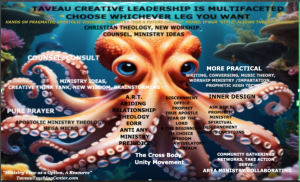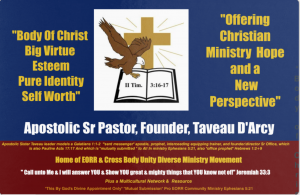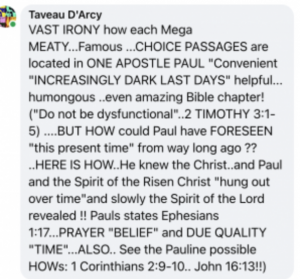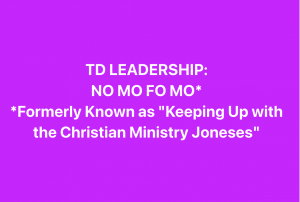This is to represent the many FACETS (non occult…legs) of the Ministry: (in the process of being MADE CLEARER)

2 TIMOTHY MY BOOK REPORT
The apostle Paul’s Last Words Prior to Departure
Note: this is prior to my upcoming, “line upon line” in depth vision Bible Study Small Series
(C)2024 Taveau D’Arcy All copyrights reserved under international copyright laws in conjunction with AI
I believe this Word from the Lord from long term TV Minister, Sr Pastor Jenzten Franklin ties in with this
Apostle, Pastor Taveau,
“The American church is on it’s last chance to come back to full life. I encourage each person, of any race, size of Christian leadership, lay, common person to heed this warning word. I train after being immersed in the born again Bible study since age 24, at the start of the ‘charismatic renewal in the United States” and ‘before’ “during” and “now” in the evolution of Bible teaching, sermons and music being packaged, well produced and growing major fan clubs”
Let us each pause and contemplate WHAT ENDURES in this last “caricature” “plain speaking “SENT Hour.
I submit it all as “Selah” for YOU to ponder, to evaluate, to hear from the Lord and to check out Apostle Paul in Holy Spirit Bible Scipture. This is not ‘autocratic” dogma and is OPEN FOR ALL TO HEAR, HEED OR DISMISS.
Sincerely, Taveau D’Arcy https://www.taveauteachingcenter.info
Here’s a detailed book report on 2 Timothy using the King James Version (KJV), with backstory, history, themes, and key doctrinal points:
Background and Authorship
2 Timothy is traditionally understood to be the final letter written by the Apostle Paul, penned around A.D. 67 during his second imprisonment in Rome. The letter is addressed to Timothy, Paul’s close protégé and a young pastor. Paul was nearing the end of his life, which is evident from the somber and reflective tone of this letter, as he imparts final instructions and encouragement to Timothy. Unlike 1 Timothy, which contains more structured church guidance, 2 Timothy is highly personal and heartfelt.
Paul wrote this epistle from a Roman prison cell, awaiting execution under Emperor Nero’s rule. During this time, the persecution of Christians had intensified, especially in Rome, and Paul himself faced severe hardship and abandonment by many of his followers. This context is crucial in understanding the urgency and intimacy of Paul’s advice to Timothy.
Historical and Cultural Context
In the first century, early Christians were under immense pressure. Timothy pastored in Ephesus, a prominent city filled with diverse cultures and religions, where Christians often faced both social and governmental persecution. Timothy faced challenges from false teachers, divisions in the church, and the need to maintain doctrinal purity.
Key Themes and Structure of 2 Timothy
2 Timothy is a blend of personal farewell and practical instruction. The letter is structured as follows:
Chapter 1: Encouragement to Remain Faithful
Paul encourages Timothy to be bold and unashamed of the gospel. He reminds Timothy of his sincere faith and spiritual heritage from his grandmother Lois and mother Eunice.
Chapter 2: A Call to Endure Hardship
Paul exhorts Timothy to be like a good soldier, a disciplined athlete, and a hardworking farmer, each of whom exemplifies endurance, discipline, and patience. He underscores the necessity of staying steadfast in ministry.
Chapter 3: Warning about Last Days
Paul describes the moral decay that will characterize the “last days,” listing traits such as selfishness, pride, and disobedience. He reminds Timothy to hold fast to the teachings of Scripture as a safeguard against these challenges.
Chapter 4: Final Charge and Personal Farewell
In his closing words, Paul gives a solemn charge to Timothy to “preach the word” with urgency. He anticipates his death but expresses confidence in his faith and commitment, famously stating, “I have fought a good fight, I have finished my course, I have kept the faith” (2 Timothy 4:7).

Important Doctrinal Points
1. The Role of Scripture (2 Timothy 3:16-17)
One of the most foundational statements in the New Testament about Scripture is found in 2 Timothy 3:16, where Paul writes, “All scripture is given by inspiration of God, and is profitable for doctrine, for reproof, for correction, for instruction in righteousness.” In Greek, the phrase “inspiration of God” is rendered as theopneustos, meaning “God-breathed.” This emphasizes that Scripture is divinely inspired and is the primary tool for teaching and guiding the church.
2. The Power of Endurance (2 Timothy 2:3-6)
Paul uses metaphors of a soldier, athlete, and farmer to teach about perseverance and dedication in ministry. Each of these metaphors stresses discipline, a common theme throughout Paul’s letters, and reflect the Greek cultural value of self-control and endurance.
3. The Last Days and Godliness (2 Timothy 3:1-5)
Paul warns Timothy about the moral corruption that will increase in the last days. He lists characteristics of people during these times, such as being “lovers of their own selves” and “having a form of godliness, but denying the power thereof.” This description mirrors cultural and religious hypocrisy, as many claim outward spirituality without genuine transformation.
The phrase “form of godliness” can be compared with eusebeia in Greek, meaning piety or reverence. However, Paul’s warning is about empty piety, which is devoid of the power and presence of God’s Spirit.
4. Endurance in Suffering (2 Timothy 1:8, 2:9, 4:5)
Paul is forthright about the suffering that comes with ministry. In 2 Timothy 1:8, he advises Timothy not to be ashamed of “the testimony of our Lord,” nor of Paul’s imprisonment. Paul’s openness about his suffering, while encouraging Timothy to endure, reflects a deeply rooted belief that suffering is a part of the Christian journey and a means to share in Christ’s own sufferings.
The Greek word kakopatheo, translated as “endure afflictions,” reflects an enduring hardship, which was a theme in many of Paul’s writings, showing that the calling to ministry is inherently sacrificial.
5. Paul’s Farewell and Hope of Reward (2 Timothy 4:6-8)
As Paul reflects on his life, he states he has “fought a good fight” and anticipates the “crown of righteousness” awaiting him. The term for “crown” here is stephanos, typically given to victors in athletic competitions, symbolizing Paul’s view of the Christian life as a race or struggle toward victory.
Paul’s assurance of this reward isn’t based on personal achievement but on his unwavering faith in Christ’s promise. This passage reminds believers that God’s rewards are for those who are faithful, not necessarily successful by worldly standards.
Key Greek and Hebrew Terms
Scripture (2 Timothy 3:16): Theopneustos – “God-breathed,” highlighting the divine origin and authority of Scripture.
Endure Hardship (2 Timothy 2:3): Kakopatheo – A term that means to suffer or endure afflictions patiently, often in the context of persecution.
Last Days (2 Timothy 3:1): Eschatos hemerai – Refers to the end times or the final period, implying the moral degradation and spiritual challenges expected before Christ’s return.

Major Lessons from 2 Timothy
Stand Firm in the Faith: Timothy is encouraged to stand firm despite persecution and to guard the truth of the gospel against false teachings.
Hold Fast to Scripture: Paul emphasizes the role of Scripture as the believer’s guide for faith and practice, stressing that it equips for every good work.
Endure Suffering for Christ: Paul models and teaches the importance of enduring hardship for the sake of the gospel.
Run the Race Faithfully: Paul’s farewell encourages believers to remain faithful and steadfast, confident in the hope of eternal reward.
Conclusion
2 Timothy offers insight into the heart of Paul as he prepares for martyrdom, providing timeless wisdom about endurance, faithfulness, and the authority of Scripture. Its message of perseverance in the face of hardship, holding fast to sound doctrine, and living a godly life is as relevant today as it was in the early church.
Paul’s final words to Timothy are a powerful reminder to all believers to “preach the word,” finish the race of faith well, and hold to the promise of life in Christ Jesus.
MORE TO COME… TD’S Chapter and verse of the entire book of 2 Timothy
TO SUPPORT: [wpedon id=”1581″]
NOTE THIS KEY 3 RD CHAPTER:


(C)2024 Taveau D’Arcy Creative Leadership All copyrights reserved under international copyright laws, in conjunction with AI













